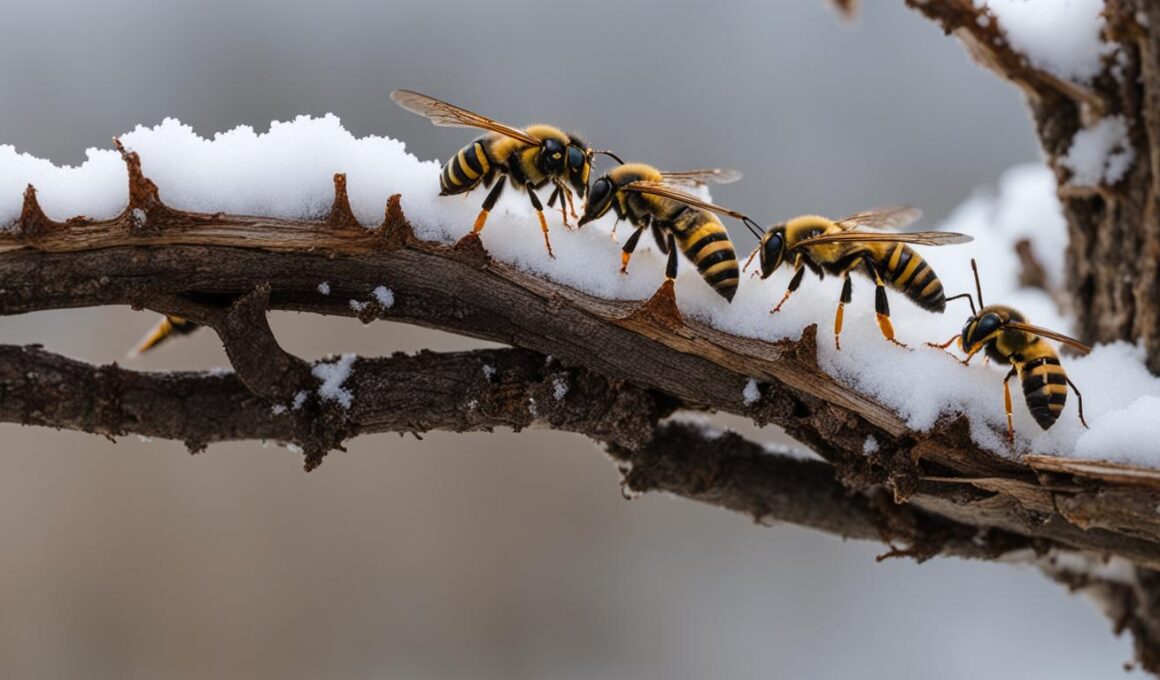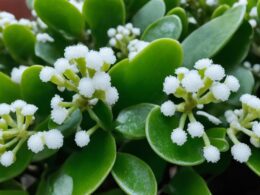When the colder months arrive, have you ever wondered what happens to wasps? As the temperature drops, their behavior and survival tactics change to adapt to the harsh winter conditions. In this section, we will explore the intriguing world of winter wasps and unveil the secrets of their winter behavior.
During winter, the majority of a wasp colony perishes with the first frost. However, a select few females with exceptional hardiness are able to survive. The survival goal of a wasp colony shifts to protecting these surviving females, who have the potential to become queens in the next season.
The surviving queen and potential future queens enter a semi-dormant state. They remain alive, relatively warm, and comfortable throughout the winter. This state allows them to conserve energy while waiting for spring.
Spring marks the emergence of the overwintering queens. They search for new locations to build their nests, which could be found in various places such as bushes, shrubs, or even the ground. The growth cycle of a new wasp colony takes around three weeks. The first hatched wasp eggs become the new colony workers, and the cycle begins again.
Now that you know what winter wasps do, let’s find out where exactly they go during the colder months. In the next section, we will explore their hidden locations and survival strategies. Stay tuned!
Where Do Wasps Go in the Winter
As the temperatures plummet during winter, the majority of wasps do not survive. However, some sexually mated female wasps have developed remarkable survival strategies that enable them to endure the cold months through hibernation in hidden locations.
- These sexually mated female wasps, known as “foundresses,” seek out secluded spots such as under tree bark or in cracks and crevices to hibernate.
- Attics, basements, and closets are additional hidden locations where these foundresses may choose to hibernate, remaining safe from the harsh winter conditions.
Hibernation poses significant challenges for wasps due to the scarcity of food and resources. By entering a dormant state and conserving energy, the hibernating wasps are able to survive until warmer temperatures return.
If you happen to find wasps in your home during winter, they are likely lethargic and can be easily removed. Taking preventative measures is essential to keep your home wasp-free. Set up wasp deterrent traps in strategic areas or contact a professional pest control service for expert assistance.
In text must include SEO relevant keywords – hibernation, survival strategies, hibernating wasps, hidden locations.
Bee Behavior in Winter Compared to Wasps
While wasps struggle to survive the harsh winter months, bees have a different strategy to ensure their survival. Unlike wasps, bees do not die off in winter. Instead, they rely on stored honey and the protection of their waxy combs to endure the cold.
Bees remain active within their cozy nests during the winter, where they maintain a constant temperature by clustering together. They feed on the stored honey, which serves as their primary food source during this time.
When spring emerges, bees are quick to take advantage of the warmer weather. They venture out of their nests to visit flowers, collecting pollen and nectar as they go. This essential task contributes to the pollination process and supports the formation of new colonies.
In contrast, wasps face a completely different fate. With the arrival of freezing temperatures, the entire wasp hive, except for the fertilized queen, perishes. The remaining queen seeks refuge by digging into the ground, where she will hibernate until spring arrives. Once the weather becomes favorable, the queen emerges from her underground hideout to establish a new colony.
Do Wasps Hibernate in the Winter Like Fleas?
Wasps do not hibernate in the winter like fleas. While some species of wasps do go dormant during the cold months, they do not enter a true hibernation state like fleas. Wasps generally seek shelter in protected areas and may even build their nests in the ground, but they do not hibernate. These are important grass flea habitat facts to be aware of.










